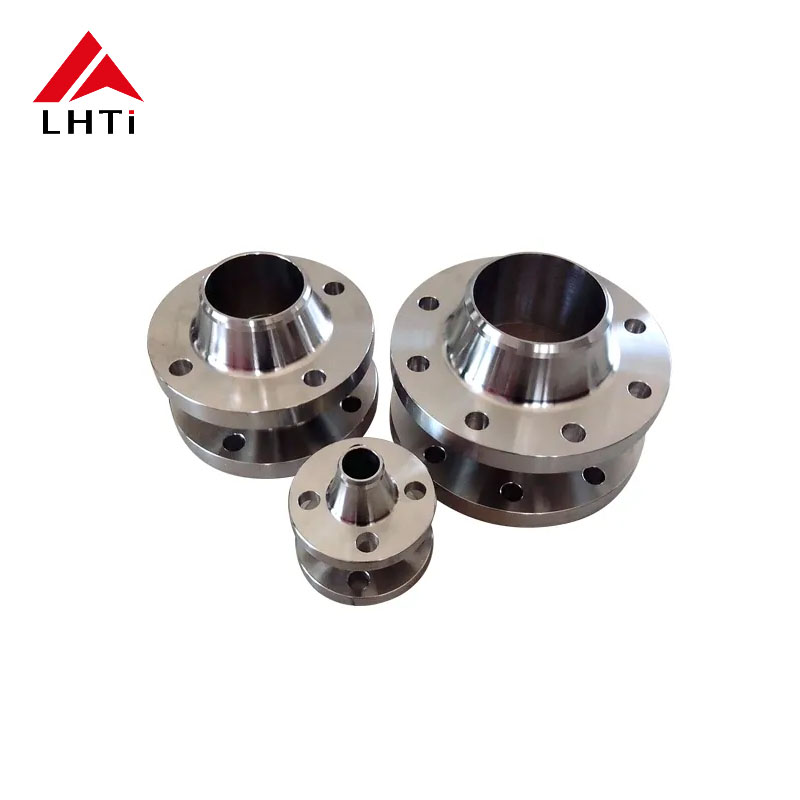| Sign In | Join Free | My qualitytoyschina.com |
|
- Home
- Products
- About Us
- Quality Control
- Contact Us
- Get Quotations
| Sign In | Join Free | My qualitytoyschina.com |
|
Brand Name : LHTi
Model Number : Weld Neck Flange
Certification : ISO9001,CE,etc
Place of Origin : Baoji, China
MOQ : 100 pieces
Price : negotiable
Payment Terms : L/C, D/A, D/P, T/T, Western Union, MoneyGram
Supply Ability : 500 Ton/Tons Per Month
Delivery Time : about 15-35 days for delivery
Packaging Details : Plywood case or pallet, or as per your requirement
Payment : TT and Paypal
Surface Finish : Smooth, Raised Face, Ring Type Joint
Advantages : Durable, long-lasting, cost-effective, easy to install and maintain
Inspection : UT%
Outer Diameter Max : 1300mm
Corrosion Resistance : Excellent
Keyword : WN titanium flange
Color : Metal Nature
Working Temperature : -60°C~250°C
Material Standard : ASTMB381
Production Method : Forged, Die forged
Connection Method : welding
Working Temp : -60℃~250℃
Qc Documents : material and dimension report as normal
Pressure : 150#-2500#
A Titanium Flange EN1092-1 refers to a specific type of flange made from titanium alloys, designed and manufactured according to the EN 1092-1 standard. This standard outlines the essential requirements for flanges, including dimensions, material specifications, and pressure classes, to ensure they are compatible with piping systems and meet necessary strength and durability standards. Titanium flanges are especially sought after in industries requiring high corrosion resistance, such as in chemical processing, marine environments, and aerospace.
Titanium is a versatile and durable material that has earned a reputation for its exceptional corrosion resistance, lightweight properties, and high strength. Titanium flanges are commonly used in applications where these qualities are crucial for system performance. Titanium alloys, such as Grade 2 (Gr2) and Grade 5 (Gr5), are widely used for manufacturing these flanges, offering a blend of strength and durability, especially under extreme conditions such as high temperatures and aggressive chemical environments.

The EN 1092-1 standard is a European norm that specifies the dimensions, designations, and material properties for flanges used in piping systems. This standard ensures compatibility and reliability in the connection of pipes, valves, and other components. It encompasses different types of flanges, including weld-neck flanges, slip-on flanges, blind flanges, and socket weld flanges, with weld-neck flanges being one of the most commonly used configurations in demanding industrial applications.

Titanium flanges, particularly those manufactured in accordance with EN 1092-1, provide a host of benefits that make them highly advantageous in specialized applications. Below are some key advantages of using titanium flanges:
Titanium is highly resistant to corrosion caused by aggressive acids, chlorides, and other corrosive substances. This property makes titanium flanges ideal for use in industries such as chemical processing, marine, and desalination plants, where exposure to harsh chemicals and seawater is common.
Compared to steel or stainless steel, titanium is a much lighter material, offering substantial benefits in applications where weight reduction is critical, such as in the aerospace and maritime industries. This helps reduce the overall weight of the piping system without compromising strength or performance.
Titanium alloys like Gr2 and Gr5 offer exceptional tensile strength, which makes them suitable for high-pressure and high-temperature systems. Even in the most challenging conditions, titanium flanges maintain their integrity and performance.
Thanks to their inherent corrosion resistance and high strength, titanium flanges typically have a longer service life compared to flanges made from other materials. This durability reduces the frequency of maintenance, downtime, and replacement costs, ultimately leading to cost savings in the long term.
Titanium flanges can be made from various grades of titanium alloys, each with specific properties that make them suitable for different applications. The most commonly used grades are Gr1, Gr2, and Gr5.
The following table summarizes the key specifications of Titanium Flanges EN1092-1 for Grades Gr1, Gr2, and Gr5 in various pressure classes:
| Feature | Titanium Gr1 | Titanium Gr2 | Titanium Gr5 (Ti-6Al-4V) |
|---|---|---|---|
| Chemical Composition | 99% pure titanium | 99% pure titanium | 90% titanium, 6% aluminum, 4% vanadium |
| Tensile Strength | ≥ 240 MPa | ≥ 345 MPa | ≥ 900 MPa |
| Elongation | ≥ 24% | ≥ 20% | ≥ 10% |
| Corrosion Resistance | Excellent in neutral and acidic environments | Excellent in acidic, alkaline, and seawater environments | Superior in high-temperature and aggressive environments |
| Temperature Resistance | Suitable for temperatures up to 400°C | Suitable for temperatures up to 450°C | Suitable for temperatures up to 500°C |
| Weight | Light | Light | Slightly heavier but stronger than Gr2 |
| Applications | Marine, chemical processing | Aerospace, chemical, power plants | Aerospace, military, high-stress industrial systems |
Titanium flanges made to EN 1092-1 standards (Gr1, Gr2, Gr5) offer unmatched corrosion resistance, strength, and lightweight properties that are ideal for demanding industrial applications. Whether used in pipeline systems in the chemical, marine, aerospace, or power industries, titanium flanges ensure long-lasting reliability and performance under extreme conditions. With superior mechanical properties and a long service life, these flanges are an excellent choice for engineers and industries that require the best in flange materials and design standards.
|
|
Metal Nature Titanium Flange Gr1 Gr2 Gr5 EN1092-1 Weld Neck Flange Class 150 for Pipeline Systems Images |